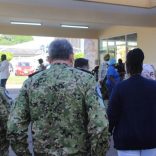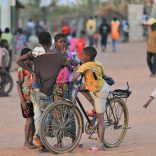Mozambique: US invested more than $70 million in school meals in 12 years - Lusa
Mozambique: Situation in Cabo Delgado “remains very delicate and without prospects” – webinar | Watch

Image: Via FEC | Fundação Fé e Cooperação on Facebook
The situation in the province of Cabo Delgado, northern Mozambique, “remains very delicate” and with little prospect of a resolution, the participants in a webinar held by six Portuguese non-governmental organizations (NGOs) saidon Tuesday.
The initiative involving the Portuguese Cáritas, Archdiocesan Mission Centre of Braga, National Justice and Peace Commission, Faith and Cooperation Foundation (FEC), Gonçalo da Silveira Foundation (FGS) and Rosto Solidário, and called “Cabo Delgado: Priority to People”, set out to debate the “tragic humanitarian situation” in areas blighted by armed conflict since October, 2017.
The conflict in Cabo Delgado has resulted in more than 3,100 deaths and internally displaced 800,000 people, 27% of them women and 52% children, according to the International Organization for Migration.
“Despite their escape and the support [they have received], this group of people lives in a situation of great precarity and vulnerability, since humanitarian aid remains insufficient for the scale of the catastrophe,” the six entities promoting the webinar claimed in the communiqué launching the meeting.
For António Juliasse, Apostolic Administrator of Pemba Diocese, “the future had seemed to take on a different aspect, until recently; now, with the spread of attacks to the [neighbouring] province of Niassa, the situation has become very complicated”.
“The province of Cabo Delgado continues just the same. Insecurity is still high, despite the presence of foreign military personnel,” added Juliasse, referring to the contingent of Rwandan troops who responded to the request of the Mozambican president, Filipe Nyusi, to help combat the insurgents.
Zenaida Machado, a researcher at Human Rights Watch, said she did not believe that Mozambique could solve the problem created by the armed groups. “It is a very poor country, with a great lack of security and state protection, which were already problems before this conflict started,” she said.
For Zenaida Machado, there are four “pillars of difficulty” in Cabo Delgado. “There is a need to restore security and ensure that the problem does not spread to other areas of the country” and “ensure support for displaced people, who lack anything and everything, namely food, medicine, decent education, registration of displaced people who lost their identity cards and jobs”.
The remaining two ‘pillars’ are “the recovery of people where there is already security and protecting them with less propaganda [from the Mozambican government’s side]”, and finally, “ensuring justice, investigation and reconciliation”.
“The [Mozambican] state should already have started an investigation and not fuelled a propaganda war against the insurgents, who have to realise that their actions imply accountability for the crimes they committed,” she stressed.
“And then there is the need for reconciliation, which must reflect the voice of women, who, along with children, are the principal victims of the conflict,” she added.
For Renamo deputy Ivone Soares, Cabo Delgado province “has always been left behind in the priorities” of the central government in Maputo.
“It is the province that also had the least support from Mozambican civil society, which made the people of Cabo Delgado feel that they are not part of Mozambique,” she alleged.
As for the Rwandan intervention, Soares stressed that it was motivated by the president: “The parliament didn’t have a say.”
“I still don’t feel that the priority is the people (of Cabo Delgado). The focus is protecting large investments, the businesses of the owners of the money,” she again protested, noting that the province is rich in oil and gas, rubies, fauna and flora.
Soares said that she still has expectations regarding the intervention that Filipe Nyusi has scheduled for Thursday in the Assembly of the Republic (parliament): “I hope it is a message of hope for Mozambicans.”
The Portuguese MEP Isabel Santos, who was in Cabo Delgado in June as a member of a European Parliament delegation, accompanied by other representatives of Portuguese parties, reviewed the support that the European Union has guaranteed to Mozambique, and acknowledged that “the power of EU in Mozambique is one of persuasion and convincing”.
Asked about the difficulties that some humanitarian organisations are experiencing in obtaining visas to enter the country, Santos said she had addressed the issue in June, and that the explanation she received cited contingencies dictated by the Covid-19 pandemic.
“The situation is indeed very worrying,” she stressed, saying that the problems in Cabo Delgado could only begin to be resolved “if the problems that are at the root” of the conflict were faced.
Santos also highlighted the intervention of humanitarian agencies: “If there was no support from humanitarian organisations, it would be catastrophic.”
The MEP advanced three facets to addressing the situation in Cabo Delgado: guaranteeing security, distributing food and “thinking about the future”.
But, she said: “Interests that are foreign to the interests of the population – who are not called upon to participate – are at play.”













Leave a Reply
Be the First to Comment!
You must be logged in to post a comment.
You must be logged in to post a comment.